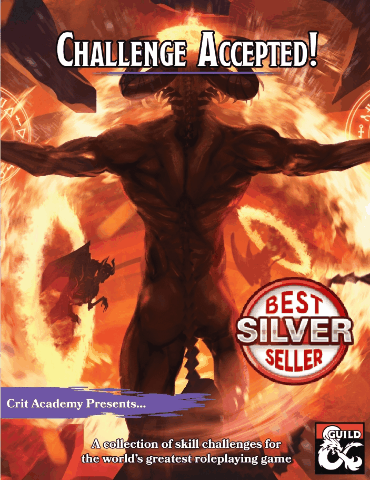Aurican's Lair: A place for all things Tabletop RPG
- Justin Handlin

- Jan 14, 2020
- 7 min read

On this episode of Crit Academy, special guest Curt Simcox, tabletop blogger for Aurican's Lair, and creator of the GATEWAY RPG joins us. We interview Curt on the inner workings of what goes into being a reviewer and blogger for all things tabletop and Dungeons and Dragons.
Unearthed Tips and Tricks: New and reusable D&D content for you to bring with you on your next adventure.
Character Concept:
My Adventures
Imagine you find yourself in town on downtime between adventures. While there, you pass
by a tavern and hear a familiar voice from within. Stepping inside, you see one of your companions, Gilbert the bard, surrounded by locals as he tells a heroic story about slaying a
red dragon and saving a princess from certain doom. You remember the adventure well; you
have a huge scar across your back from one of the dragon’s claws, and if it weren’t for you,
Gilbert would have been swallowed whole. Gilbert hasn’t noticed you, so you lean against
the door jamb listening to the tale. Then you begin to notice that not all of the details line
up. You were the one that killed the dragon’s henchmen, but Gilbert is saying he did it. The
party Cleric untied the princess and got her to safety, but Gilbert is attributing that to him
as well. You’re shocked to hear about how HE saved YOU from being swallowed by the dragon!
You clench your fists and start making your way towards him to interrupt his story and
get Gilbert to set the story straight, but then he starts telling another tale - a tale of fending
off werewolves in a faraway forest - and you remember him telling you that story when
you first met. In fact, that story was the entire reason you brought him into the party in the
first place! You begin to realize… Gilbert’s no stranger to stealing people’s stories.
This character concept is about someone who constantly tells tales of martial prowess and
clever thinking, but they often mix the details up a bit so that most (if not all) of the glory goes to the storyteller rather than the person who actually performed the feat. While these tall tales can be used maliciously, to steal glory and to fool followers into buying drinks and giving gifts, this can also be used as a clever tactic to conceal one’s identity and throw off would-be assassins and spies. The rogue, for instance, might not want stories of his unscrupulous dealings becoming public, but if he changes up some details and attributes those dealings to the party fighter, then there’s an easy scapegoat if and when consequences start piling up. At that point, the rogue can be ready with an escape plan, having expected this all along.
Monster Variant:
Cackling Zombie:
Origin Monster: Zombie New Feature:
Cackling Fever. When the cackling zombie takes damage it must make a DC 13 Constitution
saving throw. On a failed save, it takes 5 (1d10) psychic damage and becomes incapacitated
with mad laughter for 1 minute. The zombie can repeat the saving throw at the end of each
of its turns, ending the mad laughter and the incapacitated condition on a success.
Any humanoid that starts its turn within 10 feet of the zombie in the throws of mad laughter
must succeed on a DC 10 Constitution saving throw or also become infected with the cackling fever. Once a creature succeeds on this save, it is immune to the mad laughter of that particular infected creature for 24 hours.
The symptoms manifest 1d4 hours after infection and include fever and disorientation. The infected creature gains one level of exhaustion that can’t be removed until the disease is cured.
At the end of each long rest, an infected creature can make a DC 13 Constitution saving throw. On a successful save, the DC for this save and for the save to avoid an attack of mad laughter drops by 1d6. When the saving throw DC drops to 0, the creature recovers from the disease. A creature that fails three of these saving throws gains a randomly determined form of indefinite madness, as described in the DMG on pg 259.
Encounter Concept:
Undermog's Day: From Aurican's Lair
The party arrives in town just in time to celebrate Undermog’s Day, so they stay at
the local inn the night before. The day of the holiday, they meet NPCs, they make purchases,
spend time at the inn, and do what adventurers do. The next morning, they wake up and
everything seems… familiar. People they met the previous day don’t recognize them; the
purchases they made are gone; and everyone is celebrating the holiday - again.
After seeing event after event happening exactly like it did the previous day, the party
attempts to leave town, but they are stopped by some unknown force (either directly, as by a magical wall of force, or indirectly, as by a storm or barricade on the road or some other mundane force that coincidentally keeps them from leaving). The next morning, the holiday happens yet again, and there seems to be no obvious cause or exit. They are trapped in a time loop.
The exact circumstances that created the time loop, as well as potential solutions to end it, are up to the DM to determine. Maybe the players aren’t the only people in the loop. Maybe the loop has actually been going on for years, and there’s one NPC who has been stuck in it
from the very beginning. Maybe a powerful spellcaster saw a cataclysm approaching the
town, and she cast an epic spell to buy her more time until she could figure out a way to stop
the cataclysm. The PCs are going to be the key to solving it all, or they will threaten to make matters worse. Whatever you do, watch that first step - it’s a doozy!
Magic Item:
The Plummeting Pouch
Wondrous, Uncommon
The Plummeting Pouch is an unassuming canvas satchel with a thin string hanging off
one side that is worn around the waist, resting just below the wearer’s stomach. If the wearer
finds themself falling any distance and they are conscious and able to take reactions, they
can spend their reaction to activate the pouch by pulling on the string. When activating the
pouch, roll a d20; on a roll of 2 or above, the satchel opens and releases a huge canvas
parachute that grants the wearer a slow fall effect identical to the Feather Fall spell. On a
roll of 1, the parachute fails to open. The slow fall effect lasts until the wearer lands safely on
a surface, at which point the Plummeting Pouch must be removed in order to easily move around without dragging the parachute behind them. A Plummeting Pouch may only be used once, as the act of releasing the magic damages the mechanisms that kept it contained.
While a wearer has the parachute active, a creature with a ranged weapon may attempt to
damage the parachute by making an attack roll against an AC of 10. A hit reduces the potency of the slow fall effect, causing the wearer to take damage on landing as if they fell ten feet. Multiple hits stack, increasing the damage on landing by ten feet per successful hit.
DM Tip:
The Extra Encounter
You’ve planned out an epic adventure for your players, and you’ve got lots of challenges,
puzzles, and encounters meant to tax every remaining resource the entire party possesses.
You’ve been planning this adventure for weeks, and you can’t wait for everyone to show up and get started.
Then you get a text. One of the players can’t make it. Pulse pounding, you get another
saying the same thing from a different player. Before you know it, half of the party (or more)
can’t make it, but the rest will be there and are eager to play. Or, maybe they all make it to the session- but when the adventure starts and they’re about to set out on the adventure, they suddenly and unanimously decide they want to go somewhere you hadn’t planned anything for. What are you going to do?
Have an “In Case Of Emergency” folder stashed away with your gaming gear. A few
pages of encounters, some plot hooks, some puzzles, anything that you can take and slot
into an existing campaign whenever the session you had planned can’t happen for whatever
reason. There’s lots of potential resources online that you can access at your leisure, so
take a little bit of time and some forethought to save some generic material so that you can
have something to do whenever you get thrown off your schedule. Players are going to go off the rails sometimes, and life always finds a way to get in between you and your planned
adventure. Plan accordingly, and have something ready for whenever you need it!
Player Tip: Don't be a Dick! You can avoid dickitude by...
Take Pictures
Playing D&D is more than just a game, it’s a social event! When you play, you are (hopefully)
hanging out with your friends in a familiar space and having a good time. Every once in a
while, snap some pictures! Some documentation every now and then will give you something to look back on at later times that can remind you of the fun times you had playing D&D with your friends. Candid pictures, pictures of the battle-mat covered in intimidating miniatures, pictures of a player or DM acting out something that’s happening in-game, all of these moments can be fun snippets of an exciting time in your life that you’ll probably look back on fondly! Not only that, but photos can have a functional purpose too. If you have to end a session in the middle of an encounter, a picture of the battlefield can help everyone keep track of where the PCs were and what was happening when the session ended.
Of course, take the other players’ privacy into consideration when taking pictures. If
someone doesn’t want their picture taken, or if they don’t want you to share those photos on social media, respect their wishes. Most of the time that shouldn’t be an issue, so go ahead and document all of the fun times you had! I guarantee you whenever life rears its ugly head and you have to stop playing with that group for whatever reason, you’re going to wish you had taken more pictures or had more memories to look back on!
We hope you enjoyed your experience here on Crit Academy, if you did, please consider sharing our show and leaving a review here on itunes.















Comments